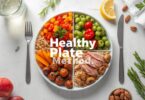Bringing a new life into the world is an incredible journey, but for many women, the next chapter is about regaining strength, confidence, and overall well-being. Postpartum weight loss isn’t about “bouncing back” overnight. It’s about gradual, safe, and sustainable progress.
While many of us wish we could magically lose all those extra pregnancy pounds the moment the baby finally arrives, the fact is, no one, not even celebs! Snaps right back to her pre-baby body so quickly.
There are numerous ways to get back into shape. But it’s really important to give yourself a break: Your body just birthed another being. Things moved around, stretched and grew to make that happen.
So rather than focusing on “getting your body back” (it actually didn’t go anywhere!), put your efforts towards creating a healthy, happy, and possibly slightly differently-shaped you.
How long does it take to lose weight after pregnancy?
Many women who gained the recommended amount of weight during pregnancy find they’re able to return to their old weight within six months to a year after giving birth, which experts say is a reasonable goal.
But that’s just an estimate, and ultimately, everyone’s timeline is unique. If you gained more than the recommended amount of weight during your pregnancy, for instance, it could take extra time, from 10 months to two years, to bounce back.
Keep in mind, too, that even once you reach that familiar number on the scale, your body might not look exactly as it did. Some women notice that their belly is softer, their hips are wider, or their breasts are smaller (particularly if they breastfed) after having a baby.
And that’s more than okay. It’s amazing! All these changes are the result of the incredible physical feat of growing your child and bringing her into the world, and they deserve to be celebrated.
Doctors and nutrition experts agree: the key is to prioritize recovery, nourishment, and realistic lifestyle changes. Here are 10 postpartum weight loss tips that are actually doctor-approved.
- Give Your Body Time to Heal
In the first 6–8 weeks after childbirth, your body is still healing, whether you had a vaginal delivery or a C-section. Doctors recommend focusing on rest, hydration, and recovery rather than dieting or intense workouts during this period.
👉 Be patient. Rushing weight loss too soon can harm your recovery.
- Focus on Nourishment, Not Restriction
Your body needs extra nutrients, especially if you’re breastfeeding. Instead of cutting calories drastically, focus on whole, nutrient-dense foods:
- Lean proteins (chicken, fish, beans)
- Whole grains (brown rice, oats, quinoa)
- Healthy fats (avocado, olive oil, nuts)
- Fruits and vegetables for vitamins & fiber
Eating well fuels recovery, supports milk supply, and still helps your body shed extra weight naturally.
- Stay Hydrated
Water plays a huge role in postpartum recovery. It:
- Supports milk production
- Helps regulate appetite (sometimes thirst feels like hunger)
- Boosts metabolism
💡 Doctors recommend at least 8–10 glasses of water per day, and more if breastfeeding.
- Start Gentle Movement Early
Once your doctor gives you the green light, gentle activities like:
- Walking
- Postnatal yoga
- Pelvic floor exercises (Kegels)
These not only burn calories slowly but also improve blood flow, reduce stress, and rebuild core strength.
- Prioritize Protein
Protein keeps you full and helps preserve lean muscle while you lose fat. Add a source of protein to each meal:
- Eggs
- Greek yogurt
- Fish
- Beans & lentils
👉 Aim for 70–100 grams of protein daily, depending on your body size and activity level.
- Don’t Skip Meals
Skipping meals can lower your energy, affect milk supply, and even slow metabolism. Instead, eat 3 balanced meals + healthy snacks. A simple structure:
- Breakfast: oatmeal + fruit + nut butter
- Lunch: salad with lean protein & healthy fats
- Snack: Greek yogurt with berries
- Dinner: grilled salmon with quinoa and veggies
- Breastfeeding Can Help (But Don’t Rely on It Alone)
Breastfeeding burns 300–500 calories per day, which can help with natural weight loss. But it’s not a guarantee that you still need a balanced diet and activity. Some women lose weight quickly while breastfeeding; others hold onto pounds until weaning. Both are normal.
- Sleep (As Much As You Can)
Lack of sleep raises cortisol (the stress hormone), which can cause weight retention, especially belly fat.
👉 Try to nap when the baby naps, and don’t be afraid to ask for help so you can get restorative rest.
- Manage Stress
Postpartum life is stressful, with hormonal shifts, lack of sleep, and new responsibilities. High stress can lead to emotional eating.
Helpful tools:
- Deep breathing exercises
- Short meditation apps
- Talking with a partner or support group
- Be Patient and Kind to Yourself
Doctors emphasize: postpartum weight loss is not a race. It often takes 6–12 months (sometimes longer) to return to pre-pregnancy weight, and that’s completely normal. Focus on how you feel, not just the scale.
Conclusion
- Weight loss after pregnancy can take time, and you may not go back to your pre-baby weight or a healthy weight straight away.
- Low-calorie diets are not recommended, particularly for people who are breastfeeding. However, decreasing your intake by about 500 calories per day is generally safe and will help you lose about 1 pound (0.5 kg) per week.
- Breastfeeding has many benefits for both mother and child. It may make weight loss more difficult in the first 3 months postpartum, but it may help you lose weight later.
- Counting calories manually or with an app may help you keep track of what you are eating and support weight loss.
- Soluble fiber may help with weight loss by increasing feelings of fullness and regulating appetite hormones.
- Protein supports weight loss by boosting your metabolism, increasing feelings of fullness, and reducing appetite.
- Keep healthy foods like fruit, vegetables, nuts, and yogurt at home and easily accessible. Store unhealthy foods out of sight or don’t keep them in the house at all.
- Processed foods are higher in added sugars, fat, salt, and calories, and they are bad for your health. Replace them with fresh, whole foods.
- Avoid alcohol if you are trying to lose weight. Additionally, the alcohol you drink may be passed to your baby during breastfeeding.
- Aerobic exercise has many important health benefits. Exercise at any level of intensity combined with a healthy eating plan makes for an effective weight loss method.
- Resistance training helps you lose weight and maintain muscle mass and may help breastfeeding women retain bone mineral density.
- Drinking water boosts your metabolism and aids weight loss. It is especially important to stay hydrated during breastfeeding.
- Poor sleep can negatively impact your weight loss efforts. Although it is difficult with a newborn, try to get as much sleep as you can and ask for help when you need it.
- In-person and online weight loss groups may be beneficial, though more research is needed to compare their effectiveness to other weight loss strategies.
- Getting to a healthy weight is important, but take care not to let your weight become a cause of stress or anxiety. If you feel you aren’t coping well, ask for help from your family, friends, or medical practitioner.




